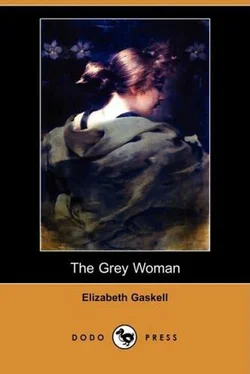I have almost forgotten to say that, in the early days of my life at Les Rochers, M. de la Tourelle, in contemptuous indulgent pity at my weakness in disliking the dreary grandeur of the salon, wrote up to the milliner in Paris from whom my corbeille de mariage had come, to desire her to look out for me a maid of middle age, experienced in the toilette, and with so much refinement that she might on occasion serve as companion to me.
A Norman woman, Amante by name, was sent to Les Rochers by the Paris milliner, to become my maid. She was tall and handsome, though upwards of forty, and somewhat gaunt. But, on first seeing her, I liked her; she was neither rude nor familiar in her manners, and had a pleasant look of straightforwardness about her that I had missed in all the inhabitants of the château, and had foolishly set down in my own mind as a national want. Amante was directed by M. de la Tourelle to sit in my boudoir, and to be always within call. He also gave her many instructions as to her duties in matters which, perhaps, strictly belonged to my department of management. But I was young and inexperienced, and thankful to be spared any responsibility.
I daresay it was true what M. de la Tourelle said—before many weeks had elapsed—that, for a great lady, a lady of a castle, I became sadly too familiar with my Norman waiting-maid. But you know that by birth we were not very far apart in rank: Amante was the daughter of a Norman farmer, I of a German miller; and besides that, my life was so lonely! It almost seemed as if I could not please my husband. He had written for some one capable of being my companion at times, and now he was jealous of my free regard for her—angry because I could sometimes laugh at her original tunes and amusing proverbs, while when with him I was too much frightened to smile.
From time to time families from a distance of some leagues drove through the bad roads in their heavy carriages to pay us a visit, and there was an occasional talk of our going to Paris when public affairs should be a little more settled. These little events and plans were the only variations in my life for the first twelve months, if I except the alternations in M. de la Tourelle's temper, his unreasonable anger, and his passionate fondness.
Perhaps one of the reasons that made me take pleasure and comfort in Amante's society was, that whereas I was afraid of everybody (I do not think I was half as much afraid of things as of persons), Amante feared no one. She would quietly beard Lefebvre, and he respected her all the more for it; she had a knack of putting questions to M. de la Tourelle, which respectfully informed him that she had detected the weak point, but forebore to press him too closely upon it out of deference to his position as her master. And with all her shrewdness to others, she had quite tender ways with me; all the more so at this time because she knew, what I had not yet ventured to tell M. de la Tourelle, that by-and-by I might become a mother—that wonderful object of mysterious interest to single women, who no longer hope to enjoy such blessedness themselves.
It was once more autumn; late in October. But I was reconciled to my habitation; the walls of the new part of the building no longer looked bare and desolate; the débris had been so far cleared away by M. de la Tourelle's desire as to make me a little flower-garden, in which I tried to cultivate those plants that I remembered as growing at home. Amante and I had moved the furniture in the rooms, and adjusted it to our liking; my husband had ordered many an article from time to time that he thought would give me pleasure, and I was becoming tame to my apparent imprisonment in a certain part of the great building, the whole of which I had never yet explored. It was October, as I say, once more. The days were lovely, though short in duration, and M. de la Tourelle had occasion, so he said, to go to that distant estate the superintendence of which so frequently took him away from home. He took Lefebvre with him, and possibly some more of the lacqueys; he often did. And my spirits rose a little at the thought of his absence; and then the new sensation that he was the father of my unborn babe came over me, and I tried to invest him with this fresh character. I tried to believe that it was his passionate love for me that made him so jealous and tyrannical, imposing, as he did, restrictions on my very intercourse with my dear father, from whom I was so entirely separated, as far as personal intercourse was concerned.
I had, it is true, let myself go into a sorrowful review of all the troubles which lay hidden beneath the seeming luxury of my life. I knew that no one cared for me except my husband and Amante; for it was clear enough to see that I, as his wife, and also as a parvenue , was not popular among the few neighbours who surrounded us; and as for the servants, the women were all hard and impudent-looking, treating me with a semblance of respect that had more of mockery than reality in it; while the men had a lurking kind of fierceness about them, sometimes displayed even to M. de la Tourelle, who on his part, it must be confessed, was often severe even to cruelty in his management of them. My husband loved me, I said to myself, but I said it almost in the form of a question. His love was shown fitfully, and more in ways calculated to please himself than to please me. I felt that for no wish of mine would he deviate one tittle from any predetermined course of action. I had learnt the inflexibility of those thin, delicate lips; I knew how anger would turn his fair complexion to deadly white, and bring the cruel light into his pale blue eyes. The love I bore to any one seemed to be a reason for his hating them, and so I went on pitying myself one long dreary afternoon during that absence of his of which I have spoken, only sometimes remembering to check myself in my murmurings by thinking of the new unseen link between us, and then crying afresh to think how wicked I was. Oh, how well I remember that long October evening! Amante came in from time to time, talking away to cheer me—talking about dress and Paris, and I hardly know what, but from time to time looking at me keenly with her friendly dark eyes, and with serious interest, too, though all her words were about frivolity. At length she heaped the fire with wood, drew the heavy silken curtains close; for I had been anxious hitherto to keep them open, so that I might see the pale moon mounting the skies, as I used to see her—the same moon—rise from behind the Kaiser Stuhl at Heidelberg; but the sight made me cry, so Amante shut it out. She dictated to me as a nurse does to a child.
"Now, madame must have the little kitten to keep her company," she said, "while I go and ask Marthon for a cup of coffee." I remember that speech, and the way it roused me, for I did not like Amante to think I wanted amusing by a kitten. It might be my petulance, but this speech—such as she might have made to a child—annoyed me, and I said that I had reason for my lowness of spirits—meaning that they were not of so imaginary a nature that I could be diverted from them by the gambols of a kitten. So, though I did not choose to tell her all, I told her a part; and as I spoke, I began to suspect that the good creature knew much of what I withheld, and that the little speech about the kitten was more thoughtfully kind than it had seemed at first. I said that it was so long since I had heard from my father; that he was an old man, and so many things might happen—I might never see him again—and I so seldom heard from him or my brother. It was a more complete and total separation than I had ever anticipated when I married, and something of my home and of my life previous to my marriage I told the good Amante; for I had not been brought up as a great lady, and the sympathy of any human being was precious to me.
Читать дальше












